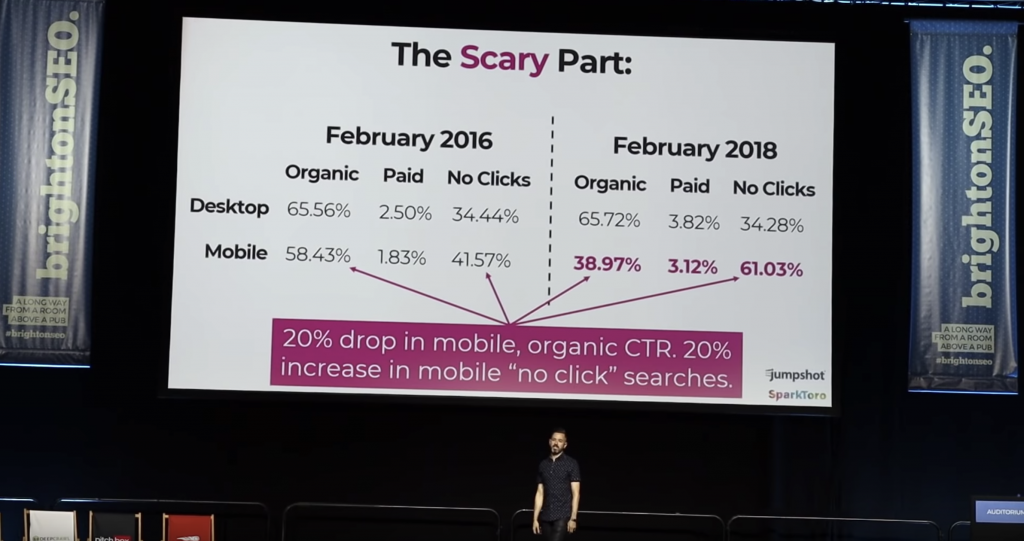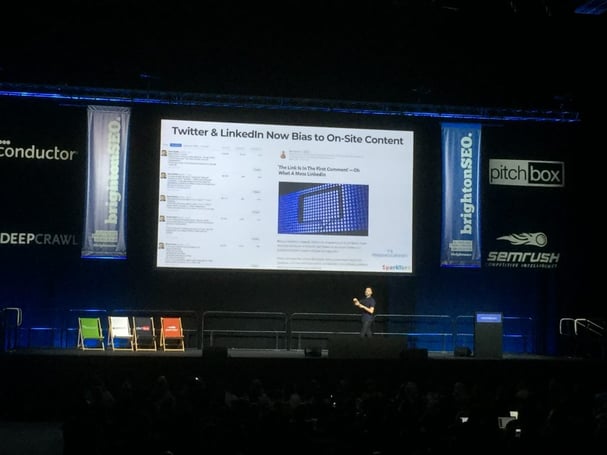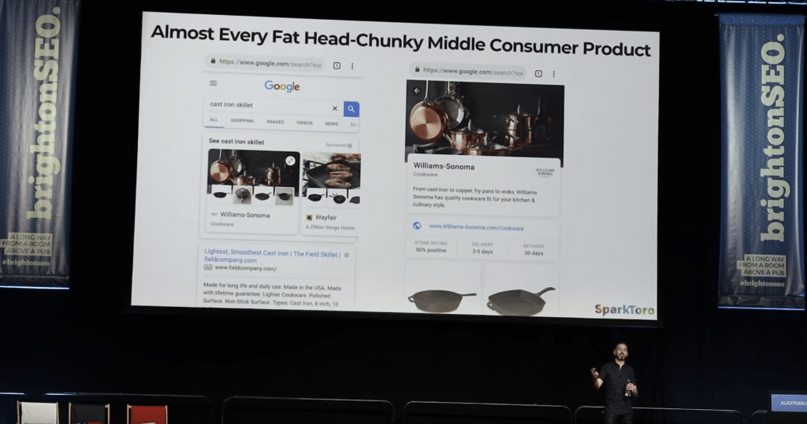3 min read
Honchō Scoops Up Two UK Search Awards!
It’s official, we've added not one, but two shiny trophies to our awards cabinet! We’re over the moon to share that we’ve triumphed at the UK Search...
7 min read
Admin : Oct 5, 2018 12:18:25 PM
Rand Fishkin delivered a controversial and passionate speech on Friday at Brighton SEO 2018. I recently covered his talk on the future of SEO and Google’s business practices. Today, I want to go further in depth, discuss everything he said, and share some opinions amongst the office here at iThinkMedia.
Firstly let’s recap everything that was said at this presentation on Friday.
“We had a deal!”
“There are millions of us, who work in content and SEO who do Google’s work. We work for Google but are not paid by them.”
Google gets to:
“In return we get clicks, we get business from appearing on their site… This deal is getting worse all the time”
Rand had debates in the past where he strongly disagreed about this statement… Until now. Rand Admits ultimately he may have been wrong overall that Google has their content creators best interests at heart.
With 3-4 big search engine competitors in 2004, Google couldn’t afford to pi** off content creators
But once they had 90% market share… Google doesn’t care anymore.
And even better results wouldn’t make people switch away – In a 2013 case study, Bing results were swapped with Google but the Google logo was left on bing, and the bing logo was left on the google results, secretly. From a survey, users preferred the one with the Google logo, not the one with Google’s results. “That my friends, is power”.
Google has monopolized the industry and because of this, they are starting to put themselves first despite who it destroys. They made a huge change to organic clicks for SEO for perhaps the first time ever late 2017. By February 2018, he showed these stats:
On mobile 2018: Paid 3.12%, Organic 38%. 61% no click searches.
Feb 2016 Mobile: Organic was 58% – that’s a 20% drop.

He showed many examples of how Google’s own services have taken reign over organic results.
“Google used to have two types of users – content creators and searchers
Now they only have one (Searchers)”
They’re all showing Google services at the top, not organic results.
Everything is biased towards Google’s own services on SERPS. Google have gutted organic results ranking top and putting their own services at the top for every major topic.
Google is driving users to scroll along their site, and not click onto your site.
Google will host someone’s website within Google. It’s a version of someone’s website inside Google. It displays product inventory, delivery, ratings etc. It’s a google hosted version and indicative of the future.
“I think what Google wants is to go back to 1996 and be AOL”
He then went on to say that this is a trend that all of the big giants are doing to keep you on their site.

It’s not just Google…
The big message is everyone including Google is trying to prevent you from leaving their site. This is hurting organic reach.
The two conflicting truths for digital marketers
Rand explained that in the first 6 years of the Facebook platform, they said we can show your business and content to tons of people. But what happened? Every business started listing specials to follow them on Facebook, promoting Facebook in return for their own promotion on the social channel. Marketers used their facebook page the centre of their campaigns. Every marketer was saying “hey, Facebook is a great source of traffic and engagement”. Then what happened? Facebook killed organic reach and decided to make it all paid promotion.
I believe, from watching Rand’s conference, that it’s far more important to focus your marketing energy on enticing users to subscribe to your site, than to like your Facebook page or follow you on other social platforms etc. You can’t afford to exclusively build up an audience on someone else’s platform that you have no control over.

Rand explains how he thinks the future is on-SERP SEO. He thinks it’s wrong and is Google abusing their power, but stresses nevertheless that we must prepare to adapt.
Rand shares some of his best tips:
If Google Biases to their Services (YouTube, G News, Maps etc) Create Content for Those Platforms: We must create content for the platforms Google is prioritising. Optimise for the places that exist. Claim your panels, create content for YouTube. If it turns into self-hosted/Google hosted versions of your store, so be it. That’s where we have to do our jobs in the future.
If You’re Using Featured Snippets, Entice the Click: He showed an example of a snippet from typing in American accents, which showed ‘20 Distinct Regional American Accents, Ranked’. The snippet only showed 5. “Some accents are better than others? I have to know where mine ranks!”.
If Other Sites Can Rank, But You Can’t, Use Barnacle SEO: Every one of the sites ranking top is influenceable through guest content, sponsored content and outreach.
Rand delivered a very interesting and passionate presentation that I enjoyed learning from. Rand’s speech was a very controversial one and did at times feel like an attack on Google and our job’s future. However, it is hard to deny the stats he showed, it’s certainly interesting and I can understand his frustrations.
I think towards the end he did talk about the positives that can come from this but didn’t emphasize anywhere near as much as he did on the negatives. I believe that with this presentation, and Google’s recent news on visual search, we must adapt to the ever-changing industry of SEO, and remain vigilant to any changes happening.
Rand’s The future of SEO had our office talking about it and I want to share with you some thoughts from our SEO experts.
“In certain situations, Google’s products being pushed to the forefront can enable sites to rank in places that were previously near impossible. Take Google For Jobs as an example, which has given everyone the opportunity to rank above the likes of Indeed and Total Jobs.
Ranking in the 10 blue links is gradually becoming less beneficial as they are diluted more and more by Google’s features and ads. If you can find your way into those new features though, the benefits of ranking highly still remain.
A knock-on to Google taking consumers straight to the endpoint means brands will lose all visibility of the customer and their journeys. Opportunities will be lost for brands to upsell, educate on their products, services and essentially lose their brand exposure and recognition.”
“Rand has a fair point around CTRs reducing and no click searches. It’s something that could be frustrating and potentially make things more difficult in a number of different markets. Even though this could hurt traditional SEO or “content creators” on the surface, ultimately, if it is better for the user then Google is doing its job.
The presentation might seem like a pretty doom and gloom look into the future, but i think there are silver linings. With every update we may lose control over something, but it comes with new opportunities. The opportunity should be our focus.
I like the term “On-SERP SEO” and it’s something we should all be thinking about and incorporating into our strategies.
Rand seems to be unhappy about filling in the different elements which contribute to Google’s owned platforms, like GMB profiles. Our aim is to optimise for search engines (SEO), if that means we fill out a card or plug-in various data sources then that’s what we do!”
To say SEO jobs may not be around for longer than 10 years is a bold statement to say the least. I do think with business interests in mind we may see a lot more organic ranking factors and a heavier focus on local targeting a part of Google Ads over the next 5-10 years.
SEO’s will need to continue to adapt and like Rand said the increasing spikes of users time being spent on SERPS is unlikely to change. But Google’s organic algorithm will always be a massive part of how websites are found on the internet and SEO knowledge will always be required to succeed.
For 2019 here are a few of things I’d give more attention to than ever:
Rand’s controversial talk in Brighton sparked interesting conversations in the office here at iThinkMedia. The general message I got from his presentation is that he feels incredibly betrayed by Google as one of the pioneers of the SEO industry. I think that the changes happening in the SEO world that Rand shared, is something we all should acknowledge and ensure that we are looking for positive solutions to ensure we thrive under Google’s new strategy.
An interesting conversation was sparked discussing a conspiracy asking, what if Google was to go down the same path as Facebook and flip the switch to an all paid future? What if the SEO algorithm was perfected and merged into Google Adwords and then with the paid algorithm?
If that happened, big companies could indeed monopolise, but quality would still have to take reign over financial investment. There would be no way Google would allow a company to thrive on their platform that many consumers had a negative consense over. In a future long from now, SEO might mutate into SEM (Search Engine Marketing). SEO will still be a huge skill but a skill around paid media.
This is all just hypothetical though and right now, 2019 will be about preparing for the near future and considering SEO practices for new technology on the horizon such as voice and visual search. As well as continuing with the pre-existing SEO markets that still make a huge difference to businesses.
Here lastly is the most important things we should all be focusing on in 2019:
I hope our thoughts can give you an insight on how to respond to everything that was said last Friday at Brighton SEO.

3 min read
It’s official, we've added not one, but two shiny trophies to our awards cabinet! We’re over the moon to share that we’ve triumphed at the UK Search...

5 min read
Understand ecommerce attribution models which attribution models can maximise your marketing efforts and ROI.

3 min read
Explore how social commerce is changing the way we shop online, blending social interactions with digital commerce for a seamless buying experience.